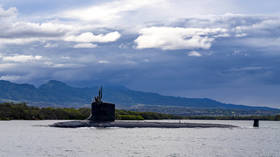China warns of ‘dangerous road’ following AUKUS deal
Beijing has warned the nuclear sub agreement between the US, UK, and Australia could trigger a regional arms race
China has expressed concerns at measures undertaken by the US, UK and Australian alliance (AUKUS) to increase its collective military presence in the Indo-Pacific, following Washington’s decision to sell five nuclear-powered submarines to Canberra.
The trilateral bloc has “gone further down a wrong and dangerous road,” Chinese Foreign Ministry spokesman Wang Wenbin said at a press briefing on Tuesday while commenting on US President Joe Biden’s decision to supply the military hardware to Australia.
The decision to sell the submarines, which are fueled by weapons-grade uranium, was announced this week following a meeting between Biden and his UK and Australian counterparts, Rishi Sunak and Anthony Albanese, at a naval base in California.
Wang warned that the deal could have broader implications towards peace in the Indo-Pacific region, and might “stimulate an arms race, undermine the international nuclear non-proliferation system and damage regional peace and stability.”
When asked on Monday if Beijing was justified in considering the nuclear submarines deal as a security threat or an act of aggression, Biden responded: “No.”
The AUKUS alliance is a trilateral agreement between the three nations to boost their presence in the Indo-Pacific region, particularly amid concerns from Western nations about an increase in Beijing’s military expansion in the area.
A joint statement released by Biden, Sunak, and Albanese on Monday said that the “historic” deal indicated the three nations sought to “sustain peace, stability and prosperity around the world.”
Beijing has been a frequent critic of the trilateral alliance since its formation in 2021. It says that the agreement between the three nations places them in conflict with accepted nuclear non-proliferation terms, with China’s mission to the United Nations accusing the trio of a “textbook case of double standards.”
Meanwhile, Washington claims Beijing routinely engages in intimidation tactics in the Indo-Pacific and around the disputed South China Sea region.
You can share this story on social media:








Comments are closed.